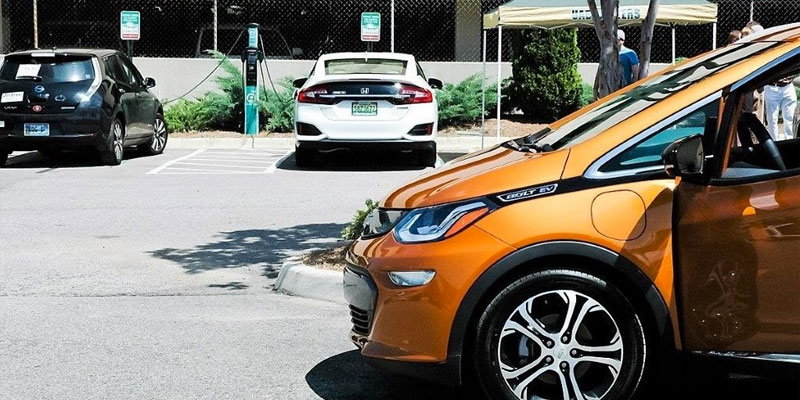The Rebuild Alabama Infrastructure Plan could provide a significant spark for efforts to expand the network of charging stations available to drivers of electric vehicles across the state.
That’s because a little noticed provision in Rebuild Alabama, approved in March to provide additional funding to improve the state’s roadways, establishes a grant program aimed at stimulating the installation of new EV charging stations in Alabama.
While several states offer various incentives for EV charging station infrastructure, researchers at the Alabama Transportation Institute at The University of Alabama say it appears that only one other state – Washington – has a similar grant program.
“By making the investment in EV charging station infrastructure through the Rebuild Alabama Act, the state is taking a proactive approach to prepare for new and emerging technologies,” said Justice Smyth, the Alabama Transportation Institute’s director of public outreach.
“This effort will likely enable more widespread adoption of electric vehicles by average consumers – many of whom currently view “range anxiety’ as a deterrent for purchase,” he added.
Smyth called Alabama’s grant program “a creative way to address coming changes in the auto industry.”
State Sen. Clyde Chambliss, a Rebuild Alabama sponsor, said the EV infrastructure grant program could serve as a model for other states that want to expand their network of charging stations.
“We hope that it’s something will work here. We think it will, and I think it’s something that other states should look at as well. Once you create a nationwide grid, then the technology really has a chance at that point,” Chambliss said.
“We’re trying to look down the road and address problems and issues before they become major. We think this is a way we can do it in this regard. Hopefully, other states will look at it, and we will all move together into the future,” he added.
FUNDING GROWTH
Here’s how Alabama’s new EV infrastructure program works: Rebuild Alabama includes a new annual registration fee to be paid by owners of battery electric vehicles and plug-in hybrid EVs. One-quarter of the funds collected from that fee will be dedicated to support grants for EV charging stations.
The program, administered by the Alabama Department of Transportation, will provide funding for municipalities, counties, universities and other public institutions to help cover some of the costs of installing EV charging stations.
Those costs can be substantial, ranging from $10,000 for a basic unit to $125,000 for a fast-charging station.
Business group in Alabama think the program will pay dividends for the state.
“Through this innovative grant program, Alabama will accelerate the expansion of EV charging stations across the state and will sit at the forefront of EV expansion,” the Birmingham Business Alliance said.
The annual registration fees total $200 for Alabama drivers of battery electric vehicles and $100 for plug-in hybrid EVs. The portion not directed to the EV infrastructure grant program goes to pay for improvements to the state’s roads and bridges.
The Washington program, which went into effect in 2016, is designed to raise $1 million annually to install 15 new charging stations a year along interstates, according to the Alabama Transportation Institute.
EMBRACING ELECTRIC
Today, there are 115 charging stations with a total of 267 charging outlets spread across Alabama, according to the Department of Energy data. An estimated 2,300 EVs are registered in the stat.
Though EVs represent a small percentage of the 5 million registered vehicles in Alabama, many believe an expansion of the EV charging network will help speed sales of the environmentally friendly cars. That would alleviate what Smyth referred to as “range anxiety” – the fear of running out of charge with no station in sight.
Alabama’s EV infrastructure program comes at a time of rising industry sales, fueled in large part by rapidly decreasing battery prices. That’s likely to accelerate as most automakers are ramping up ambitious plans with major investments to introduce more EVs in coming years.
Mercedes-Benz’s Alabama plant, for instance, will begin producing electric-powered versions of the sport utility vehicles it builds in Vance, joining plug-in hybrid models. To prepare for the launch of those models, Mercedes is now building a sprawling battery pack assembly facility in Bibb County.
“Because Alabama’s automakers are placing a strong emphasis on EVs as part of their future lineups, expanding the charging station infrastructure across the state will position us to benefit from a technology that is on its way to widespread adoption,” said Greg Canfield, secretary of the Alabama Department of Commerce.
Meanwhile, the number of electric charging stations across the nation is growing. As of September 2018, there were an estimated 22,000 public charging stations in the United States and Canada classified as AC Level 2 and DC fast charging, capable of delivering an 80 percent charge in 20 to 30 minutes.
More will be needed if growth projections hold for EVs. A Department of Energy study estimates that as many as 27,000 DC FC and 600,000 Level 2 outlets in public locations will be needed if 15 million EVs are on U.S. roads in 2030.
(Courtesy of Made in Alabama)













